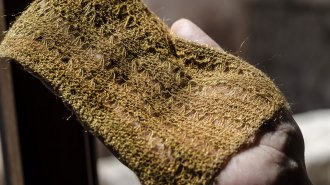Bigger, Cheaper, Safer Batteries: New material charges up lithium-ion battery work
A metal-spiced mineral may lead to cheaper batteries for cellular phones and laptop computers. The new material, which researchers would use to make lithium-ion batteries’ positive electrodes, should also be safe enough for building large, lightweight batteries for power-hungry hybrid electric vehicles and power tools.
Lithium-ion batteries, first introduced by Sony over a decade ago, are now widely used as convenient, lightweight, and rechargeable power sources for cell phones, laptops, and some other gadgets. But the batteries’ positive electrode, or cathode, is typically made of lithium cobalt oxide, which is expensive and requires electronic circuitry to keep devices from overheating when charged (SN: 12/16/00, p. 399). This risk also limits the size of the batteries.
In 1997, researchers at the University of Texas in Austin proposed a new cathode material, lithium iron phosphate, which is cheaper and safer than lithium cobalt oxide. Yet lithium iron phosphate has had one big problem: low electronic conductivity.
Now, Yet-Ming Chiang and his coworkers at the Massachusetts Institute of Technology have spiced lithium iron phosphate with small amounts of metal ions–such as aluminum, niobium, and zirconium–in a process called doping. The doped materials’ electronic conductivity is 10 million times that of unaltered lithium iron phosphate, putting them on par with conventional cathode materials, says Chiang. He and his colleagues report their findings in the October Nature Materials.
“The conductivity increase that they see is remarkable,” comments Linda F. Nazar of the University of Waterloo in Ontario. “There’s no other word for it.”
When Chiang recently presented the work to other scientists working on lithium-ion batteries, “it was, you know, ‘Wow,'” reports Ralph Brodd of Broddarp of Nevada, a battery-consulting company in Henderson, Nev.
Cathodes made of the new material could drop the price of small lithium-ion batteries, says electrochemist George Blomgren of Blomgren Consulting Services in Lakewood, Ohio.
Moreover, the development of a safer cathode material may solve problems that researchers have encountered while working to manufacture large lithium-ion batteries, Blomgren says. These would replace the heavier nickel-metal hydride ones typically used in hybrid electric vehicles.
The performance and safety of the new cathode material are “the kinds of things you need to make a good, low-cost battery,” adds Brodd.
The material now needs some technical fine-tuning before it can be incorporated into batteries for testing. But if further development goes well, batteries using the new cathode material could become available within 2 to 3 years, says Chiang.
****************
If you have a comment on this article that you would like considered for publication in Science News, please send it to editors@sciencenews.org.







